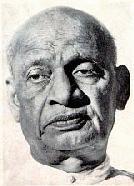|
Patel is depicted as a supporter of Hindu chauvinism,
but his major concern was national
unity
Fifty years after India won freedom, the myth that Sardar Patel
was anti-Muslim persists. In this fascinating essay, Dr Rafiq Zakaria,
the respected scholar, reveals the truth about Patel
and India's Muslims.
 Commenting on the above letter, S Gopal, whose three-volume biography
of Nehru has become a classic, and who is quite critical of the
Sardar, wrote that 'Patel is usually depicted as a supporter
of Hindu chauvinism, but actually his major concern was national
unity.' He has even observed that Dr Rajendra Prasad was more non-secular
than Patel.
Commenting on the above letter, S Gopal, whose three-volume biography
of Nehru has become a classic, and who is quite critical of the
Sardar, wrote that 'Patel is usually depicted as a supporter
of Hindu chauvinism, but actually his major concern was national
unity.' He has even observed that Dr Rajendra Prasad was more non-secular
than Patel.
I come to the question of separate electorate for Muslims
in various elective bodies, from panchayat samitis and municipalities
to the state legislatures and the two houses of Parliament; again
I do not propose to go into its history or the why and how of
its introduction by the British way back in 1906. Suffice it to
say that the Muslims believed that it was the only safeguard for
their due representation, while the Hindus, by and large, felt
that it was a clever way to keep the two apart.
At first, the
Constituent Assembly had conceded that the minorities, including
the Sikhs and the Muslims, along with the Scheduled Castes be
given reservation of seats under joint electorate; that was in
July 1947, a month before Partition. Its aftermath changed the
whole outlook of most members; they apprehended that even such
reservations would strike at the root of secularism.
A sub-committee
was, therefore, constituted under the chairmanship of the Sardar
to review the question; at this time the Sikhs more than the Muslims
were vociferous in their demand for separate electorates
for their people. They also asked for many more guarantees. Among
the members of this committee was Begum Aizaz Rasul, the
most prominent woman in the League hierarchy, who had chosen
to remain in India; she was a Sunni Muslim. So was Maulana Hifzur
Rehman, a confidant of Azad. The other Muslim member was Tajammul
Husain, a Shia. Dr B R Ambedkar, the Scheduled Caste leader,
was naturally on it and played a notable part.
At the very first meeting Dr Ambedkar objected to the reopening
of the question; but the Sardar, as the chairman, overruled it.
Maulana Hifzur Rehman then pleaded for reservation; Tajammul Husain
chided him for his volte face in encouraging communalism. The Sikh
members were firm on the retention of the old formula. All through,
the Sardar sat in stolid silence, easing the tension occasionally
by a light remark here and there. As there were differences among
the members, the chairman adjourned the meeting, requesting the
members to work out, in the meanwhile, some agreed solution.
At the next meeting on May 11, 1949, the nationalist Muslims,
on the advice of Azad, proposed the abolition of separate electorate
for the Muslims; Begum Aizaz Rasul seconded the proposal on behalf
of the League. She spoke, surprisingly, with great eloquence
on the virtues of a united front with Hindus. The Sikhs were taken
aback by the Muslim turn-about. They had relied on the Muslim
stand to make their demand. No dissident voice was, therefore,
raised.
The Sardar kept quiet all through; he gave no indication
of his views; their volte face cut off the ground of the Sikhs.
It is not known whether he had any discussion with Azad to the
issue; but the sudden change in the Muslim attitude was apparently
due to Azad. Consequently, the Sardar wound up the proceedings
on a note of satisfaction; he was happy that there was a consensus
on the abolition of separate electorate for minorities. So he
put the seal of the Committee on it. Only for the Scheduled Castes,
a ten-year period of grace was accepted.
Excerpted from Sardar Patel and Indian Muslims, by Rafiq Zakaria, Bharatiya Vidya Bhavan, 1996, Rs 125, with the author's permission. Readers interested in buying a copy of the
book may write to Bharatiya Vidya Bhavan, Kulapati K M Munshi Marg, Bombay 400 007.
|

